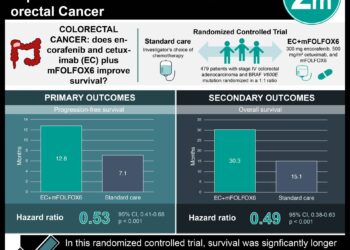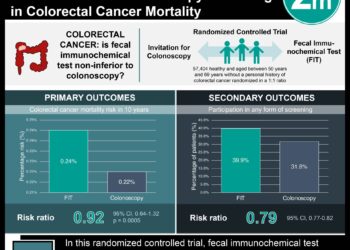Single dose aspirin prior to fecal immunochemical testing does not increase detection of advanced colorectal neoplasms
1. In this randomized controlled trial, single dose aspirin given two days prior to fecal immunochemical testing (FIT) did not increase test sensitivity for detection of colorectal cancer at 2 predefined cutoffs.
2. Study findings contrast with previous observational studies that showed increased sensitivity of FIT in users of low-dose aspirin.
Evidence Rating Level: 1 (Excellent)
Study Rundown: Fecal immunochemical testing (FITs) for hemoglobin (Hb) has been shown to outperform guaic-based fecal occult blood tests (FOBTs) in their diagnostic accuracy. Based on observational study data, it has been suggested that use of aspirin may result in enhanced sensitivity of FITs in detecting advanced adenomas. In this randomized clinical trial, the usage of aspirin did not increase test sensitivity in detecting advanced colorectal neoplasms at 2 predefined cutoffs.
Overall, this study suggests that aspirin use prior to FIT may not increase detection of advanced colorectal neoplasms. Limitations include sensitivity analysis being based on relatively few participants with advanced neoplasms. Future research may consider optimizing the dosage and timing of aspirin intake to more rigorously determine if aspirin is able to enhance FIT sensitivity similar to previously published observational cohort studies.
Click to read the study published today in JAMA
In-Depth [randomized controlled trial]: This is a randomized, double-blind, placebo-controlled trial that was conducted across 18 trial centers (14 gastroenterology practices and 4 hospitals) in Germany. Advanced neoplasms were defined as the presence of colorectal cancer (CRC) or advanced adenoma that either was 1 cm or larger in size, had tubulovillous or villous components, or high-grade dysplasia. Participants were sent 4 stool collections kits for either a quantitative or qualitative FIT test, both used widely in Germany. Stool samples were collected prior to taking the trial medication, and then 2, 3, or 4 days after taking the trial medication. Primary outcome was sensitivity of the quantitative FIT in detecting advanced neoplasms at 2 pre-defined cutoffs (10.2, cutoff for qualitative test and 17 ug Hb/g stool, cutoff for quantitative test) in fecal samples collected 2 days after trial medication intake. Secondary outcomes included specificity, positive predictive value, and negative predictive value of both the quantitative and qualitative FIT tests, and potential gain in sensitivity by combining results from multiple fecal samples scheduled on any day between day 2 and day 4. In this study, 2422 participants were randomized, and 2134 were included in the analysis. Overall, advanced neoplasms were found in 224 individuals (10.5%), where 8 participants (0.4%) had CRC and 216 participants (10.1%) had advanced adenomas. For the 10.2 ug Hb/g stool cut-off, sensitivity in the aspirin and placebo groups were 40.2% and 30.4% (p = 0.14) and for the 17 ug Hb/g stool, sensitivity in the aspirin and placebo groups were 28.6% and 22.5% (p = 0.32). Use of aspirin prior to FIT did not significantly increase test sensitivity for detecting advanced colorectal neoplasms.
Image: PD
©2019 2 Minute Medicine, Inc. All rights reserved. No works may be reproduced without expressed written consent from 2 Minute Medicine, Inc. Inquire about licensing here. No article should be construed as medical advice and is not intended as such by the authors or by 2 Minute Medicine, Inc.







